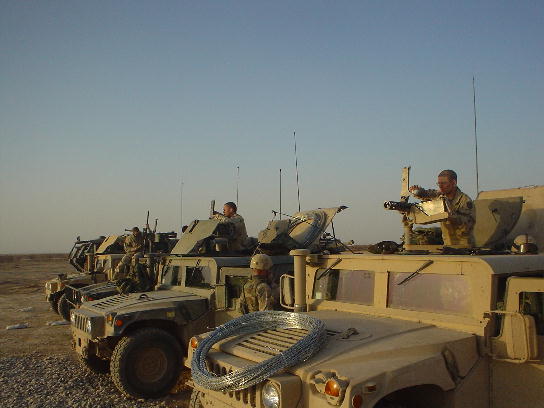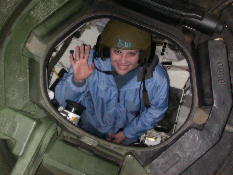April 30, 2004
1. TABLE 15
Amazing results. UN-sanctioned involvements ranked much lower on the "how do you think [country of deployment] will be after American soldiers leave" scale than Iraq does. In the other missions, the soldiers thought that their involvement meant very little in the long-run, but in Iraq it appears that they believe their presence will make a positive difference. That says something huge! Our soldiers appear to be saying that the Iraq deployment has focus and that, being run by Americans, has a much higher chance of success than if it were run by the UN. Fascinating finding, in my opinion.
2. TABLE 17
There is a big difference between officer morale in OIF and in WWII; in OIF there's a much higher percentage of reported low morale. Reasons for this? Other than the fact that maybe officers feel more comfortable griping these days, I can't come up with anything.
However, this was a survey of only 389 soldiers, so that means only 54 people out of all of the deployed soldiers said they have low morale. I have no idea how they got the results from WWII, but if the sample size is different, then the results mean little. I have not been able to find the original, and Blackfive didn't post a link, so I'm not sure where the WWII data comes from.
See, I did learn something from How To Lie With Statistics!
MORE TO GROK:
Since I am a grokking tyro, I enlisted the help of a bigger mind to check out the numbers. Mr. Den Beste wrote me back last night; as usual, he thinks of things I didn't catch:
Given your specific situation, it's easy to see why you'd be concerned about
this.I'm not so sure that the difference to which you refer is really very significant or very mystifying. Officers, quite naturally, feel more responsible for a situation than enlisted, and the situation in Iraq is not really the same as it was in Europe. Americans knew more about Europe and understood the local culture much better, for one thing. Iraq is a more alien place.
A different thing I find myself wondering about is just when it was that the WWII survey happened. If it was about one year after VE day, that would be a
lot different than if it was perhaps three years after VE day. Europe was also pretty unsettled in the first year, but by three years things had stabilized quite a lot. Thus officers, feeling responsible, would have indicated greater comfort at the three year point than at the one year point.Frankly, I didn't really see anything in that report that I found too surprising, or anything that worried me deeply. (Obviously I wish it were better than it is...)
Posted by: Sarah at
09:46 AM
| Comments (1)
| Add Comment
Post contains 489 words, total size 3 kb.
April 28, 2004
Posted by: Sarah at
04:15 AM
| Comments (1)
| Add Comment
Post contains 90 words, total size 1 kb.
April 27, 2004
Posted by: Sarah at
05:17 PM
| Comments (1)
| Add Comment
Post contains 31 words, total size 1 kb.
Posted by: Sarah at
03:11 AM
| Comments (3)
| Add Comment
Post contains 29 words, total size 1 kb.
April 23, 2004
Posted by: Sarah at
02:00 AM
| Comments (2)
| Add Comment
Post contains 40 words, total size 1 kb.
April 20, 2004
Three may keep a secret, if two of them are dead. -- Benjamin Franklin
The hardest part about being a spouse is keeping things opsec. Last week I got myself in trouble by being too informed: I keep up on the news and know what's going on, and our rear detachment SSG got upset that I told another soldier what I had learned; he thought I had gotten the info from down range instead of from Associated Press! I am trying to be very cautious about what I talk about now, even if it's already in the news, but it's really hard for me to not share information with other wives who are just as concerned as I am. For example, I just found out something very interesting, but I don't think I can trust anyone else not to spread it. If I let myself tell just one person, and then she lets herself tell just one person, and so on, then I might as well tell everyone. I hate to keep the information inside -- I feel like I could explode right now -- but I know it's best if I don't share. I've already seen how fast stories can circulate, and I don't want to contribute to that. I have to learn to keep it quiet; man, is that a skill I don't have!
Posted by: Sarah at
08:46 AM
| Comments (3)
| Add Comment
Post contains 228 words, total size 1 kb.
April 19, 2004
MORE TO GROK:
Of the $87 million allotted for Iraq, 75% of it was supposed to go towards military expenditures, CavX recently taught me. Never forget that Kerry voted for this proposal before he voted against it. If Kerry had gotten his way, we probably wouldn't even have the HMMWVs and body armor that we have now...
Posted by: Sarah at
06:05 AM
| Comments (5)
| Add Comment
Post contains 94 words, total size 1 kb.
April 17, 2004
Posted by: Sarah at
06:02 PM
| Comments (1)
| Add Comment
Post contains 20 words, total size 1 kb.
Firefighter as sexiest job? Pshaw.
Posted by: Sarah at
04:10 AM
| Comments (2)
| Add Comment
Post contains 19 words, total size 1 kb.
April 16, 2004
Posted by: Sarah at
08:39 AM
| No Comments
| Add Comment
Post contains 7 words, total size 1 kb.
His soldiers destroyed Rooney's claims.
Posted by: Sarah at
06:54 AM
| No Comments
| Add Comment
Post contains 13 words, total size 1 kb.
April 14, 2004

This is their mission.
US Troops Set for Showdown with Cleric
Get 'er done, boys.
Posted by: Sarah at
02:38 AM
| Comments (4)
| Add Comment
Post contains 21 words, total size 1 kb.
April 13, 2004
My recurring disclaimer: I am not in the Army. That said, I think that one paragraph in this email is based on her brother's guesses; as a warblogger, I have a differerent view based on things I've read.
His most pessimistic views were reserved for the future of the US military, especially the Army and the reserve forces. The Army's longterm morale appears to be at severe risk due to its being so overstretched. Re-enlistments by the very backbone of the Army (senior NCO's and Officers) are going to start dropping like a rock unless the situation changes in the estimation of my brother. This is doubly the case with the Reservists, upon whom the military has become so dependent. In addition, our military personnel are terribly underpaid given the missions that they are called upon to fulfill during this wartime era. Many military families live at near subsistence level incomes, are required to make huge sacrifices in terms of risk to loved ones and constantly having to move, and struggle to make ends meet.
I agree that morale is probably not as high as it was during the late 90's, when no one in the Army had to do much except train, but I know of a lot of soldiers who are proud and eager to be deployed. I know of one on rear detachment who is positively livid that they've left him here. Some soldiers really do want to soldier; that's why they took the job in the first place.
As for re-enlistment, so far it has been steady. Our gut reaction is that no one would willingly sign up to do such a nasty job, but the military is right on track for the enlistment goal at this time of year.
And, yes, all soldiers are "terribly underpaid" when you consider that they're on call 24 hours a day for a year. But, as I linked to the other day, military pay is something that is more nuanced than it appears.
Even in their first year of service, E-4s pull in more than $18,600 per annum, and more than $19,600 in their second year of service, and that's in base pay. Throw in BAH Type II for a married soldier (assuming 0 differentials. He earns more money if he has children) and he's really making $25,887 per year in his second year of service.
The military pay scale is all laid out for you here.
Except that while he's deployed, he's also getting hostile fire pay ($3,000 per year), family separation pay ($3,000 per year) and an allowance for per diem expenses of 3.50 per day, or 1,277.50 per year. So now we're up to $33,164.50.
But money earned in a combat zone is exempt from federal income tax. So assuming the soldier's in the 15% tax bracket, that income yields an after-tax equivalent of $38,139.18 per year.
And we haven't even figured in the value of free food for the soldier while he's deployed, or free medical care for the soldier's dependents.
So Ehrenreich's $16,000 per year figure--while not far off the mark if the soldier's a screw-up and doesn't get promoted and you only count base pay--is wildly inaccurate when it's vetted by someone who actually knows what he's doing.
And the LT? The first year 2nd Lieutenant while deployed in Iraq, makes an after-tax equivalent of $61,462.67 (somewhat less than that, actually, because he's in a marginal 15% bracket, not an effective one. But you get the idea.)
Where ELSE can you be 19-24 years old and pull in that kind of salary?
Yes, we military families make sacrifices. No, we don't want anyone to have to be deployed for a year. But a soldier's job is to soldier, and a military family's job is to be supportive of the mission. Many of us understand what that means and the sacrifices it takes -- we know about deployments and the pay scale when we sign up -- but the rewards of supporting and defending our country outweigh the grievances.
Posted by: Sarah at
11:11 AM
| Comments (3)
| Add Comment
Post contains 707 words, total size 4 kb.
April 09, 2004

Get 'er done, guys.
Posted by: Sarah at
05:00 AM
| Comments (1)
| Add Comment
Post contains 8 words, total size 1 kb.
April 07, 2004

Thanks, Jim.
Posted by: Sarah at
12:52 PM
| Comments (7)
| Add Comment
Post contains 42 words, total size 1 kb.
The plus side of the deployment is that my husband is making more money than we know what to do with. Our grocery bills have shrunk by $200 per month since he's gone, we saved $500 cutting him from insurance, and he's making much more than he did before he left, due to his promotion and deployment benefits. We may miss each other immensely, but we're sure not poor.
Posted by: Sarah at
08:52 AM
| Comments (1)
| Add Comment
Post contains 98 words, total size 1 kb.
April 03, 2004
I want to see many more photos like this one.
Posted by: Sarah at
02:50 AM
| No Comments
| Add Comment
Post contains 47 words, total size 1 kb.
April 02, 2004
Donald Sensing, among others, commented Wednesday on a female airman who refused the order to get her Anthrax shots. He found the story via Texas Native:
"I have a kid to take care of," said [Airman Jessica] Horjus, 23, the mother of a 2-year-old, who lives with her daughter in military housing at Seymour Johnson Air Force Base in Goldsboro, N.C. "The Air Force can always fill my slot with someone else, but who's going to fill the mommy slot?"
She got demoted, and another SGT who also refused the shots can't seem to understand why he's in trouble. Andrew Olmsted minces no words; he says these people should not pass Go and definitely shouldn't receive their $200. (He also has a lengthy collection of reasons why one would serve; the first letter was extremely interesting.)
The idea that people join the military and then balk at doing what it takes to be a servicemember is not surprising. I'm reminded a post by Sgt Mom and my favorite comment by Lori:
Classroom full of uncanned relish in Basic training, USAF. First day of instruction. Our TI goes around the room asking people why they volunteered for the service. A variety of answers are given - everything from 'money for college', 'travel', 'adventure', 'family tradition', 'opportunity to get myself out of my small town', etc. After everyone was done, the TI's response was 'You joined the Air Force to die for your country. Everything else is secondary'. Talk about a reality check.
I may not have ever been in the military, but I work directly with the "secondary" that Lori talks about. Working in the Education Center here has been a very rewarding experience so far, but it offers an interesting window into some people's priorities.
One of the great military "secondaries" is the education benefits. The Army will pay for you to get your education, up through a PhD if you so desire. (Unfortunately, there are some major flaws here, which I will discuss in another post.) However, your getting your education is in fact secondary to your duties as a soldier. When I hear soldiers complain time after time that their unit isn't giving them time to take classes or that they have to deploy and are never going to get done with their degrees, I have a hard time sympathizing. The Army does not need to give them time to get a degree. If they can squeeze it in, great. All of our classes are offered nights and weekends to maximize the chances of them squeezing it in, but no one ever guaranteed them that they could get it done. Their education is secondary.
I've also heard family members complain that Veterans' benefits are not transferrable; that is, the soldier can't give his free tuition to his spouse or kid who just graduated from high school. There has been talk of this happening in the future, and I personally think it's not appropriate. Soldiers earn this secondary benefit because of their service; if their children want the benefits, then they need to serve as well. The father cannot decline an education but pass on the monetary value to someone else. Education benefits are the reward for your service, not a gift certificate to be passed on to whomever.
I've met and heard of several soldiers who joined the military to get free college. My husband also started out with this idea. He needed to find a way to pay for school, and he looked into the Reserves before deciding to go the ROTC route. He earned those benefits too, only getting five hours of sleep most school nights and devoting most weekends and all of his summers to the military. Throughout his three years, he learned that the hours he put in to ROTC did not quite equal out to the monetary value of the education benefits he received, but he had gained something more valuable than money: he was a leader in the best military in the world.
Military benefits are always secondary to being a soldier. If you want to be a student, then you shouldn't be in the military, you should be in college. And even if you did join the military for the benefits, you can't change your mind once the going gets tough. When my husband signed the dotted line, he was not thinking about al Qaeda, but when the time came, he balled up and met the challenge. So must all soldiers. Yeah, there are no Education Centers in Iraq for you to work on your degree, and you might not have enough computer access to take an online course. But you can't bitch about it. Your job is to soldier, not to study.
Posted by: Sarah at
10:35 AM
| Comments (2)
| Add Comment
Post contains 822 words, total size 5 kb.
Not all educations are equal. My husband went to Truman State University. He got 100% tuition assistance through ROTC; the 2004-2005 in-state tuition is $5410 per year. My husband's best buddy went to Johns Hopkins. He also got 100% tuition assistance, which for 2004-2005 is $28,730. Ouch. My husband's entire college career cost less than one year for his buddy. That seems a little lopsided to me.
Another trick comes when you fill out your VA paperwork for your GI Bill. There's a space for whichever degree you are working on, and the catch is that this answer is binding. If you say Associates Degree, then the money cuts off after you get your AA. When filling out this paperwork, always put PhD; you can get less education than you requested but not more.
But by far the biggest flaw I've noticed in the system has to do with the withdrawal rate for active duty soldiers. We hold classes in 8-week blocks. A soldier must request a tuition assistance form, get it signed by his commander, and turn it in. Theoretically, in signing the TA, the commander acknowledges that the soldier will be busy with this class, and a commander should not sign the form if he anticipates that the soldier will not have time for the course. However, this never happens in practice. The Army wastes hundreds of thousands of dollars each year paying for classes that soldiers cannot finish: they deploy, they have CQ a couple of times and can't get caught up, or they go to the field. This is terrible. If a soldier withdraws himself from a class, the tuition is deducted automatically from his paycheck. But if the Army withdraws the soldier for mission-related activities, the Army still pays the college the full amount for the course. On our post alone, we get roughly 100 withdrawals per year. That's $50,000 that the Army pays to the school, and the soldier gets no college credit whatsoever. And that's only on our small post; multiply that by all the schools on all the military posts around the globe, and it's some serious cash. The Army will also pay for the soldier to take the same class again at a later date. It's shocking how lax soldiers and commanders are about the tuition assistance. I have a real problem with it, but not for the same reason the soldiers do. They complain because they're never allowed to finish their courses; I complain because our government is paying for them to never finish their courses. Sometimes things really do come up unexpectedly, but it's a real waste to keep registering soldiers for classes they're never going to complete.
Posted by: Sarah at
10:16 AM
| Comments (1)
| Add Comment
Post contains 478 words, total size 3 kb.
62 queries taking 0.1335 seconds, 236 records returned.
Powered by Minx 1.1.6c-pink.














